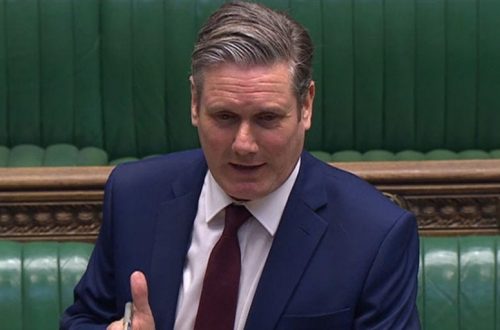A debate about protests/demonstrations is underway across several left blogs at the moment and Norman Geras’s post on the issue today has links to most of them as well as, of course, containing his own take on the issue.
To those who cliam that the nature of Saddam’s regime was not the issue in the build up to war, Norman has this to say:
The issues of the war and opposition to it just were about the Saddam Hussein regime as well. This large monster of an issue wasn’t another issue, or at least it wasn’t a totally distinct one. It was squatting there, and shrieking out, from the very same location where the issues of the war and opposition to it had set up camp. And if there was anyone who didn’t see this immediately, there were enough others, supporters of the war, who kept pointing it out to them.
…., no special extra effort of mobilization, no large investment of additional energy, would have been needed by any of those involved, in order to have made a relevant protest about the ‘other matters’ here. If they couldn’t see their way to absenting themselves from the anti-war marches – morally speaking, the best stance, and the most logical one, for those with feelings of solidarity for the Iraqi people but such serious misgivings about a US-led invasion as to have felt unable to support it – they should have made it clear on their banners and in their slogans where they stood vis-à-vis the Baathist regime. They didn’t and still don’t. Likewise vis-à-vis the war on terror. Of course, that one doesn’t protest about a thing doesn’t necessarily imply endorsement of it. But in certain contexts the balance of what one says and what one omits to say is significant, and it can have important public effects.
Indeed it is significant. At the risk of repeating my previous post on this issue, people and organisations supporting demonstrations make choices about their slogans, their statements and the content of their speeches.
So why was there no significant statement on the Istanbul atrocities at last week’s protest? Why on the February 15 march was it easy to spot anti-Blair, anti-Bush and anti-Sharon placards but one had to search hard to find those who felt Saddam Hussein was also worth of condemnation? Why on Thursday was it hard to see any indication of opposition to a terrorist atrocity that had taken place that day?
The arguments presented in the comments boxes on this site include: I think in answer to why there are no protests against Al Qaeda terrorism is simply that it would be an extremely odd thing to do. For at whom would it be directed? Does Osama Bin Laden gauge the strength of public opinion in Britain before making his next move?
Of course he doesn’t, although one might ask whether he and his supporters would be encouraged or discouraged by a demonstration which made no reference to their atrocities whilst labelling George Bush “the world’s number one terrorist”?
The point though is that a demonstration aims to send out a political message and is a self-description of the protestors. This message is not only received by the target of protest (in this case Bush and Blair) but by the public – not just in the UK but globally.
The message last week was this : we are against George Bush and we have nothing to add about terrorism or about the current situation in Iraq other than “end the occupation”.
Leaving aside the matter of Istanbul for the moment, what message was there for the Iraqi people? Was there the slightest hint of solidarity of support for democracy of condemnation of the attacks on Iraqi civilians by the ‘resistance’?
This is how one Iraqi blogger received the message:
I was ashamed and depressed watching those brainwashed and deluded demonstrators in London carrying signs calling for abandoning Iraq and for an end to aggression. While I can understand people who hold peaceful principles against wars in general but nevertheless wish to see Iraq free and prosperous, I fail to understand the logic behind the thinking that appeasing and understanding terrorists will make this world a better place. It was all the same ‘No blood for oil’, ‘Not in my name’, ‘Bush is Hitler’, ‘Stop the war’, ‘End the occupation’, ‘Bring the troops home’ nonsense over and over again. It was almost like one of our masira’s in the dark times of the previous regime. If those people truly dislike Bush they should have kept their mouths shout about other issues which they can never understand and sticked to anti-Bush slogans.
The only thing that warmed my heart was watching different self-respecting people carrying banners that said ‘Mr. Bush you are most welcome, this lot does not speak for me’. I ditto that and add that this lot surely does not speak for Iraqis either. I’m sure Saddam is proud of you and clapping his hands in glee watching from whatever gutter he is hiding in right now. The fact that Al-Arabiyah station decicated two whole hours covering these demonstration while not a single subtitle about the anti-terrorism crowds marching in Iraq only disgusted me the more.
So the question “for whom would it be directed?” is answered. Protests may be primarily, formally, directed at one person or one government but they resonate far beyond the immediate target.
Worse, the slogan “End the Occupation” would have been laughed off by Bush and Blair, the official targets of the protest but the slogan’s impact on Iraqis struggling for democracy against fascism was demoralising. One can only hope they know the demonstrations were not in the name of the majority of British people.
There is another argument put forward that it is not only pointless to condemn Saddam, Bin Laden and others but it is actually conceding ground to your opponents.
The most explicit statement of this view came in the immediate aftermath of the atrocity at the World Trade Centre when the Socialist Alliance put out a statement which condemned the attack..
The Socialist Workers Party, a leading component in the Alliance and the Stop the War Coalition actually opposed the inclusion of the word ‘condemn’ in the statement. Indeed they went as far to make their position clear in a seperate communique which includes the following passage:
We do not believe that the use of the word ‘condemn’ is appropriate in relation to the tragic events in the US.
Clearly we do not support the attacks on working class people and it should go without saying that we oppose the strategy of individual terrorism. This would be our preferred way of stating our case.
But the language of ‘condemnation’ is that which is always required of socialists and national liberation movements by the media and the ruling class. It would have been better to avoid it for this reason.
The most important task of socialists is to patiently explain why the US government is hated so much and why there are people who are prepared to kill themselves and many others in opposing the US. The answer is US imperialist foreign policy.
I am often criticised here for spreading the brush too widely across the anti-war movement but when we are looking at why that movement refuses to use the language of condemnation then surely the official line of the most influential political force within that movement is relevant.
Indeed I would venture that while few would take the SWP’s position over September 11th (and I am talking tactics here and ignoring here the appalling political content of that statement), many anti-war people would view condemning Saddam as something that was required by the “media and the ruling class” and therefore to be avoided. I have certainly heard people argue that there is “no point” in condemning Saddam because “Bush and Blair have done that” and that the main task was to condemn the “warmongers”. But was the case against the war so weak that it would be undermined by making other points?
But, as we are frequently reminded by readers here, there is much more to the anti-war movement than the Socialist Workers Party and there are many who will willingly condemn Saddam and the terrorists. There are those who opposed the war because of concerns about the future of the UN, or fear of setting an unwelcome precedent, or because they are pacifists, or they did not trust the United States to conduct a war for democracy and many other legitimate arguments.
This is beyond dispute but still fails to deal with the central problem of the choices made at these demonstrations. I suspect that the SWP has a big influence on the content and style of the protests – from slogans down to the speakers list but where has been the dissent from the SWP’s refusal to condemn either terrorism or Saddam?
Where have been the letters to the left press protesting against Stop the War’s failure to condemn? Where have been the public meetings organised by those who reject slogans such as “End the Occupation, “Troops Out of Iraq Now”? Where on the demonstrations have been visible signs of solidarity with democrats in Iraq or other victims of terrorism?
There have been a few honorable exceptions but on the whole there has been little opposition to the SWP’s approach. The SWP are widely disliked even among those ideologically close to them yet there has been a passive acceptance of their approach.
The SWP’s refusal to speak the language of condemnation is the main problem but the failure of others to condemn their approach explains how they have managed to get away with their shameful position and is part of the problem.
Those who have passively accepted the political content of these demonstrations share the responsibility for the message that was sent last week and its effects.


